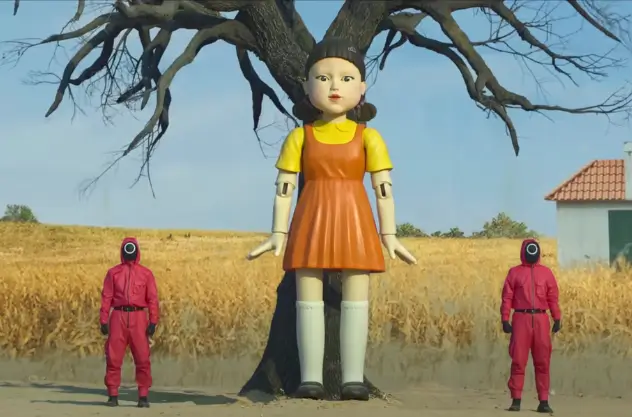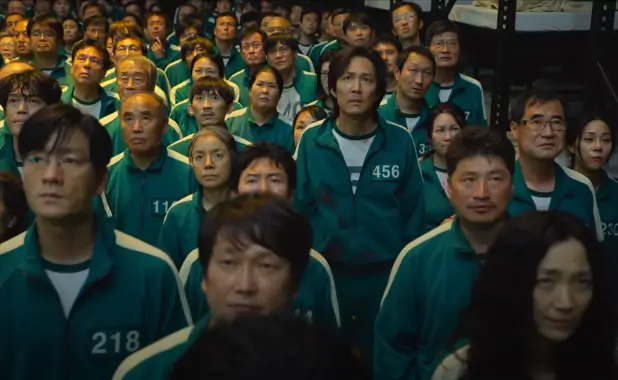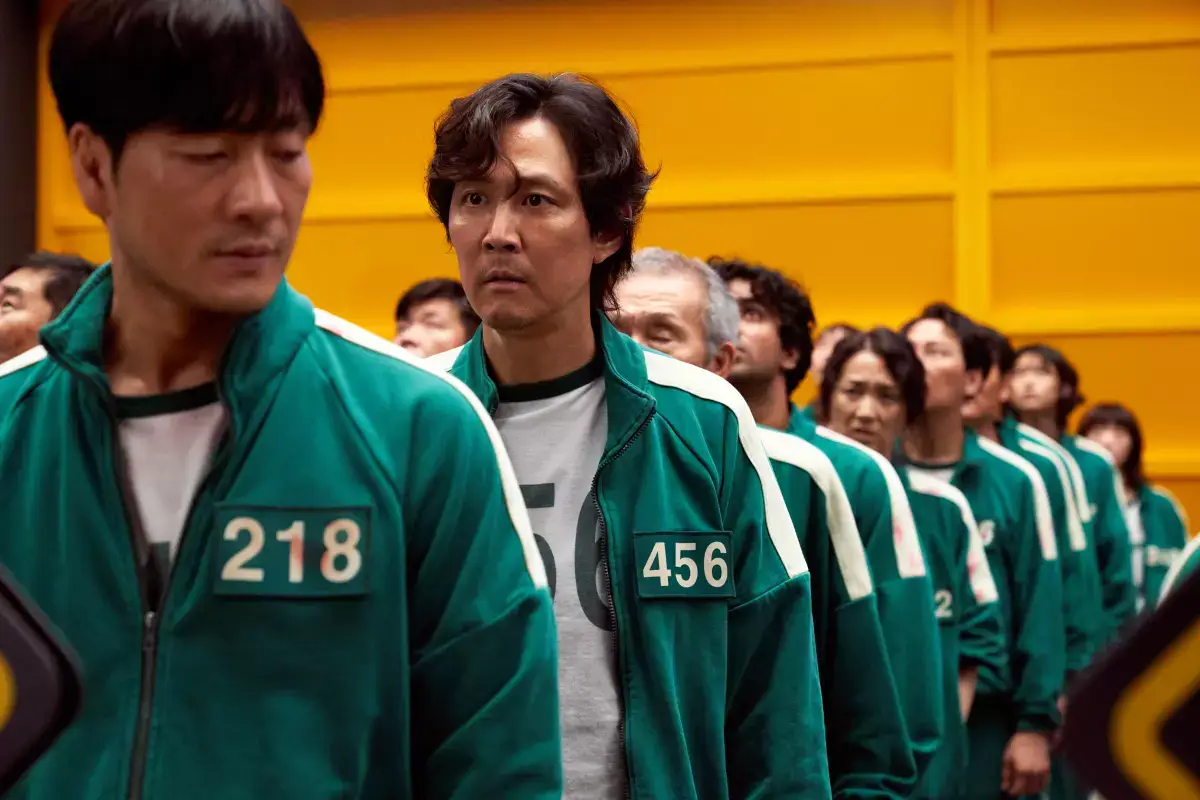Squid Game isn’t just a tale of survival; it’s a stark reflection of society’s unforgiving realities. Players are pushed beyond their physical and mental limits from the first slap in Ddakji to the devastating final Squid Games. Beneath the vibrant pinks, greens, and nostalgic games lies a chilling story of desperation, manipulation, and moral dilemmas. This article explores the psychological toll, strategic thinking, and social commentary within the deadly arena, offering insights into the humanity—or lack thereof—at play.
Squid Game isn’t merely a tale of survival; it’s a piercing reflection of society’s harsh and unforgiving realities. From the initial slap in the game of Ddakji to the devastating final round of the Squid Game, players are relentlessly pushed beyond their physical and emotional limits. Beneath the bright hues of pink and green and the nostalgic childhood games lies a chilling narrative of desperation, manipulation, and moral dilemmas, as Talkativefox explains today.
Strategies That Define Winners

Survival in Squid Game often depends on quick thinking and adaptability. Each challenge demands players to think creatively and make the most of their circumstances.
Those who adapt to the game mechanics survive longer in Red Light and Green Light. Sang-woo’s observation that the doll functions as a motion sensor saves many players, proving that understanding the rules is just as important as physical ability.
Adaptability in Red Light, Green Light
Gi-hun’s creative approach to the Dalgona game—using his saliva to dissolve the sugar and ease the carving process—highlights the value of ingenuity. This simple yet effective strategy turns a seemingly impossible task into a manageable one, demonstrating how thinking outside the box can be a lifesaver.
The Strategy Behind Every Move
Winning in Squid Game isn’t just about brute force or luck—it requires calculated strategies. Players must think on their feet, adapt to new challenges, and exploit every opportunity to gain an edge.
In Tug-of-War, brute strength isn’t the deciding factor. Gi-hun’s team proves this by employing clever tactics like leaning back to destabilize the opposing team and timing their pulls for maximum impact. Their strategic approach turns the tide against seemingly stronger opponents, underscoring the importance of teamwork and mind games.
Outwitting the Odds in Tug-of-War
The Glass Bridge game is a stark reminder of unpredictable survival. Players are forced to rely on chance, with tempered glass tiles offering safety and regular glass leading to a fatal fall. This randomness adds a layer of psychological stress, as even the most calculated players are at the mercy of luck.
The Psychological Toll on Players

The participants in Squid Game endure more than just physical challenges; they face relentless psychological torment. Each game amplifies their fears, shatters their trust, and forces them to confront their darkest instincts. The arena is designed to break them mentally, reducing their humanity to a fight for survival.
Fear is the driving force in every competition. Players constantly live on the edge, knowing that one wrong move means death. The tension is palpable in games like Red Light and Green Light, where even a slight twitch can lead to elimination. This constant fear traps players between their survival instincts and paralyzing panic, creating an atmosphere of sheer terror.
Moral Dilemmas
Games like Marbles turn friends into adversaries, highlighting the fragility of trust. Alliances crumble under pressure as players choose between their lives and their loyalty. These moral crossroads reveal the lengths individuals will go to in their fight for survival, even at the cost of their humanity.
The Social Commentary in Squid Game
Squid Game is more than a thriller; it’s a scathing critique of societal structures. The games are metaphors for real-world inequalities, showcasing how desperation and systemic failures drive individuals to extreme measures.
The series mirrors societal hierarchies, where the wealthy manipulate the lives of the less fortunate for entertainment. The participants’ plight reflects the struggles of those caught in cycles of poverty and debt, emphasizing how systemic inequalities perpetuate exploitation.
Returning to the arena isn’t a choice but a necessity for many players. Their lives outside are so bleak—burdened by debt and societal rejection—that the deadly games seem like their only hope. This desperation underscores the lack of opportunities available to the marginalized, forcing them into life-threatening situations.
Lessons from Gi-hun’s Journey
 Gi-hun’s arc is a testament to the human spirit’s resilience. Despite the horrors he endures, he holds onto his moral compass, setting him apart from many other participants.
Gi-hun’s arc is a testament to the human spirit’s resilience. Despite the horrors he endures, he holds onto his moral compass, setting him apart from many other participants.
Compassion Amidst Chaos
Gi-hun’s refusal to kill Sang-woo in the final round speaks volumes about his humanity. Despite the brutality of the competition, he chooses compassion over victory, showcasing the enduring power of empathy even in the darkest circumstances.
Winning doesn’t come without consequences. Gi-hun’s victory is bittersweet, as he struggles with guilt and trauma long after leaving the arena. His journey highlights the emotional scars that come with survival and the moral compromises made along the way.
Conclusion
Squid Game is a harrowing exploration of human nature, blending survival tactics with profound social commentary. It reminds us that beneath every competition lies a reflection of society’s harsh realities. Whether through fear, strategy, or desperation, the players’ experiences are a chilling reminder of what individuals can do when pushed to their limits. Yet, amid chaos, small acts of humanity shine through, offering a glimmer of hope. Ultimately, Squid Game isn’t just a story of survival—it’s a mirror to our world and a call to question the systems that govern it.
The series delves deep into human psychology, unmasking the vulnerabilities and instincts that surface when survival is at stake. It’s not just about the games themselves but also the strategies, alliances, and betrayals that reveal the fragility of trust. Beyond the individual struggles, Squid Game serves as a powerful commentary on societal inequities, spotlighting systemic issues.
The show’s gripping narrative forces us to confront uncomfortable truths about human nature. The cost of survival and the systems perpetuating inequality and despair.

